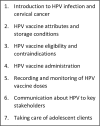Nationwide introduction of HPV vaccine in Zimbabwe 2018-2019: Experiences with multiple cohort vaccination delivery
- PMID: 36962162
- PMCID: PMC10021852
- DOI: 10.1371/journal.pgph.0000101
Nationwide introduction of HPV vaccine in Zimbabwe 2018-2019: Experiences with multiple cohort vaccination delivery
Abstract
The World Health Organization (WHO) recommends the human papillomavirus (HPV) vaccine for girls aged 9-14 years for cervical cancer prevention and encourages vaccinating multiple cohorts in the first year to maximize impact. The HPV vaccine was introduced nationwide in Zimbabwe in 2018 through a 1-week school-based campaign to multiple cohorts (all girls 10-14 years old), followed by a single cohort (grade 5 girls in school and age 10 girls out-of-school) in 2019. During the 2019 campaign, the multiple cohort's second dose was concurrently delivered with the single cohort's first dose. We interviewed national-level key informants, reviewed written materials, and observed vaccination sessions to document HPV vaccine introduction in Zimbabwe and identify best practices and challenges. Key informants included focal persons from government health and education ministries, in-country immunization partners, and HPV Vaccine Strategic Advisory Group members. We conducted a desk review of policy/strategy documents, introduction plans, readiness reports, presentations, and implementation tools. Vaccination sessions were observed in three provinces during the 2019 campaign. Key informants (n = 8) identified high cervical cancer burden, political will, vaccine availability, donor financing, and a successful pilot program as factors driving the decision to introduce the HPV vaccine nationally. The school-based delivery strategy was well accepted, with strong collaboration between health and education sectors and high community demand for vaccine identified as key contributors to this success. Challenges with transitioning from a multiple age-based to single grade- and age-based target population as well as funding shortages for operational costs were reported. Zimbabwe's first multiple cohort, school-based HPV vaccination campaign was considered successful-primarily due to strong collaboration between health and education sectors and political commitment; however, challenges vaccinating overlapping cohorts in the 2019 campaign were observed. Integration with existing health and vaccination activities and continued resource mobilization will ensure sustainability of Zimbabwe's HPV vaccination program in the future.
Copyright: This is an open access article, free of all copyright, and may be freely reproduced, distributed, transmitted, modified, built upon, or otherwise used by anyone for any lawful purpose. The work is made available under the Creative Commons CC0 public domain dedication.
Conflict of interest statement
The authors have declared that no competing interests exist. Author Adelaide Shearley was unable to confirm their authorship contributions. On their behalf, the corresponding author has reported their contributions to the best of their knowledge.
Figures
References
-
- Zimbabwe Cancer Fact Sheet [Internet]. International Agency for Research on Cancer, World Health Organization; 2020. [cited 2021 Jan 15]. Available from: https://gco.iarc.fr/today/data/factsheets/populations/716-zimbabwe-fact-....
-
- World Health Organization. Human papillomavirus vaccines: WHO position paper. Wkly Epidemiol Rec. 2014. Oct;465–92.
-
- Government of Zimbabwe. Application for Form for Country Proposals: Providing approximatly two years of support for an HPV Demonstration Programme [Internet]. 2013. [cited 2020 Jul 8]. Available from: https://www.gavi.org/country-documents/zimbabwe.
-
- New Vaccine Post-Introduction Evaluation (PIE) Tool [Internet]. World Health Organization; 2010 [cited 2020 Jul 22]. Available from: https://apps.who.int/iris/bitstream/handle/10665/70436/WHO_IVB_10.03_eng....
Grants and funding
LinkOut - more resources
Full Text Sources

